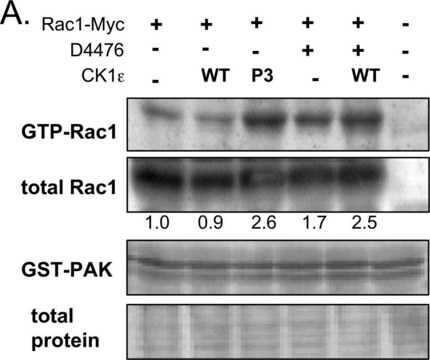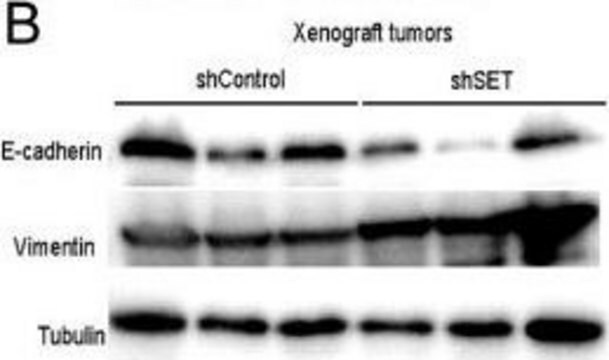MABE953
Anti-phospho RNA Pol II (Ser2), clone 3E7C7 Antibody
clone 3E7C7, from rat
Synonym(s):
DNA-directed RNA polymerase II subunit RPB1, RNA polymerase II subunit B1, DNA-directed RNA polymerase II subunit A, DNA-directed RNA polymerase III largest subunit, RNA-directed RNA polymerase II subunit RPB1
About This Item
Recommended Products
biological source
rat
Quality Level
antibody form
purified immunoglobulin
antibody product type
primary antibodies
clone
3E7C7, monoclonal
species reactivity
monkey, canine, human, rat, mouse
technique(s)
ChIP: suitable (ChIP-seq)
ELISA: suitable
immunocytochemistry: suitable
western blot: suitable
isotype
IgG2aκ
NCBI accession no.
UniProt accession no.
shipped in
wet ice
target post-translational modification
phosphorylation (pSer2)
Gene Information
human ... POLR2A(5430)
Related Categories
General description
Immunogen
Application
Epigenetics & Nuclear Function
Transcription Factors
Western Blotting: A representative lot detected phospho RNA Pol II (Ser2) in 10 µg of HeLa cell lysate (Odawara, J., et al. (2011). BMC Genomics. 12:516.).
Chromatin Immunoprecipitation Analysis: A representative lot from an independent laboratory immunoprecipitated phospho RNA Pol II (Ser2) in HeLa cell lysate (Odawara, J., et al. (2011). BMC Genomics. 12:516.; Maehara, K., et al. (2013). Nucleic Acids Res. 41(1):54-62.).
Chromatin Immunoprecipitation-Sequencing Analysis: A representative lot from an independent laboratory immunoprecipitated phospho RNA Pol II (Ser2) in HeLa cell lysate (Odawara, J., et al. (2011). BMC Genomics. 12:516.; Maehara, K., et al. (2013). Nucleic Acids Res. 41(1):54-62.).
ELISA Analysis: A representative lot from an independent laboratory detected phospho RNA Pol II (Ser2) in a panel of unmodified and modified RNA Pol II (Ser2) proteins (Prof. Taro Tachibana, Cell Engineering Corporation.).
Immunocytochemistry Analysis: A 1:500 dilution from a representative lot from an independent laboratory detected phospho RNA Pol II (Ser2) in HeLa cells (Prof. Taro Tachibana, Cell Engineering Corporation.).
Alexa Fluor™ is a registered trademark of Life Technologies.
Quality
Western Blotting Analysis: 0.5 µg/mL of this antibody detected phospho RNA Pol II (Ser2) in 10 µg of HeLa cell lysate.
Target description
Physical form
Storage and Stability
Other Notes
Legal Information
Disclaimer
Not finding the right product?
Try our Product Selector Tool.
Storage Class Code
12 - Non Combustible Liquids
WGK
WGK 1
Flash Point(F)
Not applicable
Flash Point(C)
Not applicable
Certificates of Analysis (COA)
Search for Certificates of Analysis (COA) by entering the products Lot/Batch Number. Lot and Batch Numbers can be found on a product’s label following the words ‘Lot’ or ‘Batch’.
Already Own This Product?
Find documentation for the products that you have recently purchased in the Document Library.
Our team of scientists has experience in all areas of research including Life Science, Material Science, Chemical Synthesis, Chromatography, Analytical and many others.
Contact Technical Service








